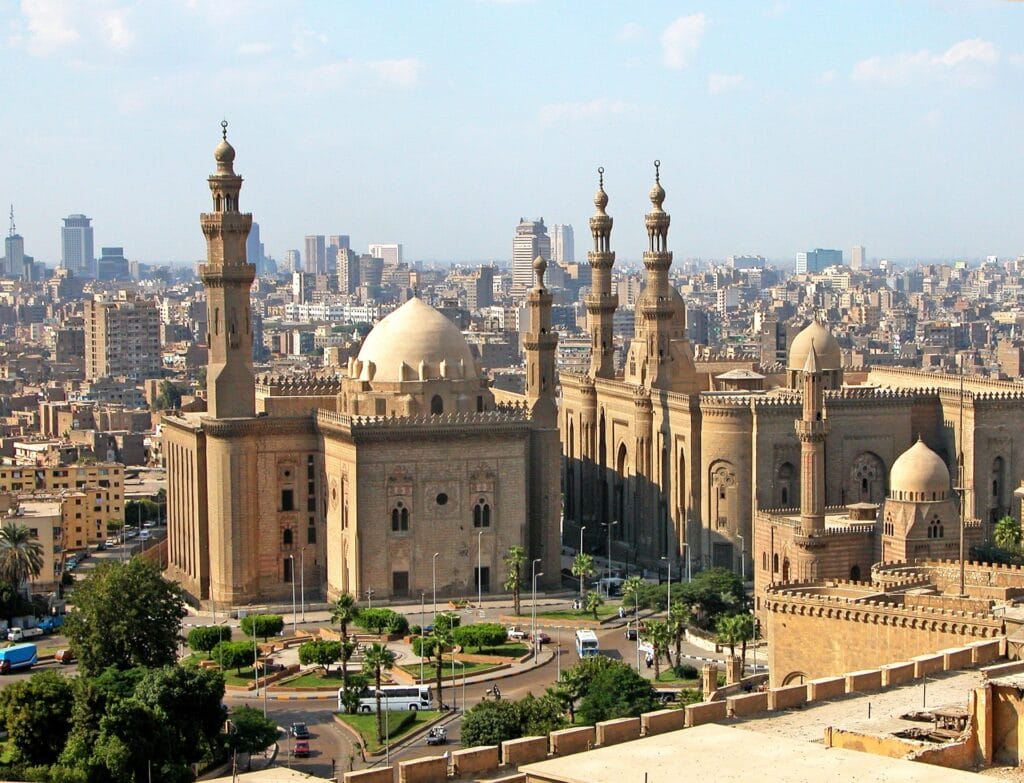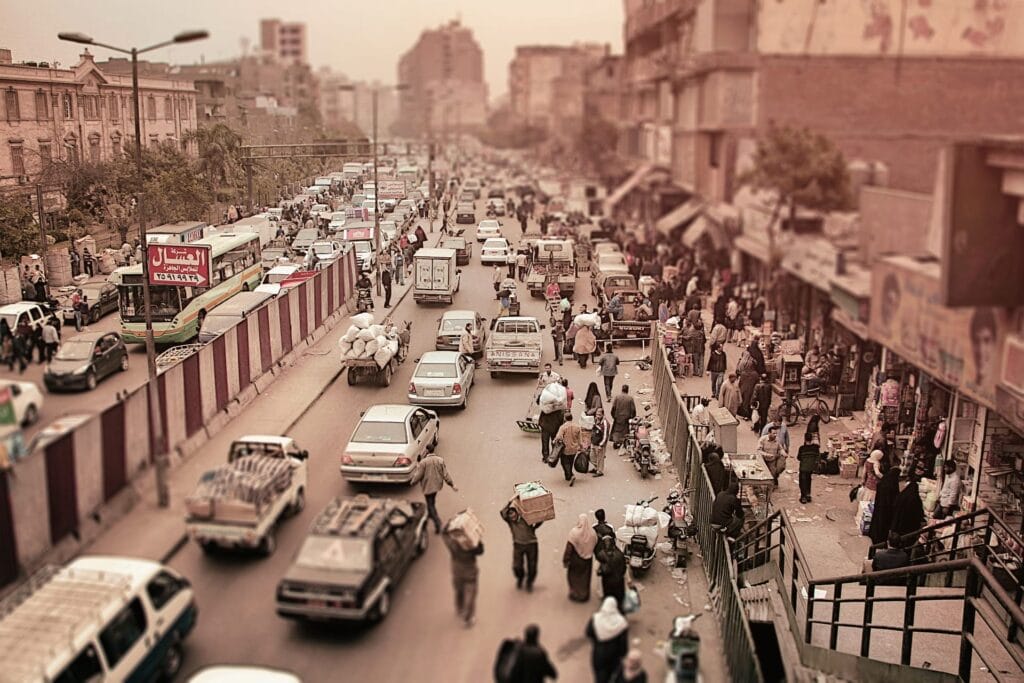Cairo, Egypt’s vibrant capital, is a treasure trove of history, culture, and culinary delights, earning it the #9 spot in Best Places to Visit in Africa in 2023. Nestled along the Nile River, this sprawling metropolis, home to approximately 20 million people, is famed for its rich historical sites and significant cultural heritage, attracting around 9 million tourists yearly. With its hot desert climate, Cairo promises travelers extremely hot summers and relatively mild winters, making it a unique destination year-round.
This ultimate travel guide unfolds Cairo’s best-kept secrets, from navigating its historical corridors to indulging in its mouthwatering cuisine. Readers will discover the optimal times to visit, essential transportation tips, and insights into Cairo’s modern shopping and nightlife scenes. Additionally, the guide will explore the cultural etiquette and customs tourists should know, ensuring a seamless immersion into the heart and soul of Egypt.
Best Time to Visit Cairo
When planning a trip to Cairo, understanding the seasonal variations and choosing the right time to visit can significantly enhance your experience. Here’s a breakdown of what to expect during different times of the year:
- Winter (December-February):
- Weather: Daytime temperatures hover in the upper 60s°F, offering a comfortable climate for exploring.
- Tourist Season: This is the prime tourist season, so expect more crowds and higher prices, especially around the Christmas holidays.
- Recommendation: Ideal for sightseeing historical sites and enjoying outdoor activities without the discomfort of high heat.
- Spring (March-May):
- Weather: A beautiful season with daytime highs ranging from the mid-70s to low 80s°F in early spring, and warming up to between 77–90°F in late spring.
- Tourist Season: The waning of winter crowds and the approach of summer heat marks this as a sweet spot for visiting Cairo. Sandstorms can occur in early March, making it a less busy time.
- Recommendation: With gorgeous weather and reasonable flight and hotel prices, spring offers an excellent balance for visitors.
- Summer (June-September):
- Weather: Temperatures during these months can be quite high, ranging from the high 80s to mid-90s°F, and can even reach up to 104°F. The city experiences its lowest tourist traffic due to the heat.
- Tourist Season: Low season, with fewer tourists and potentially lower prices, but sightseeing can be challenging due to the heat.
- Recommendation: Best suited for those who don’t mind the heat or are interested in activities like snorkeling off the beaches of Sinai. Consider indoor museums and shopping centers to escape the midday sun.
- Fall (October-November):
- Weather: The heat begins to retreat, making the climate more pleasant for visitors, with temperatures similar to the spring season.
- Tourist Season: Another great time to visit, with the summer crowds gone and the winter tourists yet to arrive. However, flight and hotel prices start to rise as you move closer to December.
- Recommendation: Ideal for enjoying both outdoor and indoor attractions without the extremes of Cairo’s summer heat or the peak season crowds.
General Tips:
- Optimal Visit Time: Between October and April, when days are comfortably warm and nights are cool, offering the best overall experience for most travelers.
- Avoiding Crowds: Late April, May, September, and early October are shoulder months with fewer tourists and more manageable prices.
- Dealing with Heat: If visiting during the summer, plan indoor activities during the hottest parts of the day and explore early mornings or late afternoons.
This strategic approach to planning your visit based on Cairo’s seasonal characteristics can help ensure a more enjoyable and comfortable trip, allowing you to fully immerse yourself in the wonders of Egypt’s capital.

Top Historical Sites
Cairo, the heart of Egypt, is a city steeped in history that spans millennia, offering travelers a unique glimpse into the past with its remarkable array of historical sites. Among these, the Giza Necropolis stands out as a testament to ancient engineering and religious devotion, comprising the iconic Great Pyramid of Giza, the Pyramid of Khafre, and the Pyramid of Menkaure, along with the enigmatic Sphinx. This UNESCO World Heritage site not only captivates with its grandeur but also with the mysteries that it continues to hold.
- Key Historical Attractions in Cairo:
- Giza Pyramids Complex: A symbol of Egypt’s grandeur, including the Sphinx.
- Egyptian Museum: Over 120,000 artifacts including Tutankhamun’s treasures.
- Citadel of Saladin & Mosque of Muhammad Ali: A fortification with panoramic views of Cairo and a mosque known for its alabaster walls.
- Islamic Cairo: Home to hundreds of historically significant Islamic structures.
- Khan El Khalili Bazaar: A bustling market dating back to the 14th century offering a variety of traditional goods.
- Coptic Cairo: An area rich with some of Egypt’s oldest Christian churches.
- Mosques and Madrasas: Including the Sultan Hassan Mosque and Al-Azhar Mosque, showcasing Islamic architecture.
When visiting these sites, it’s essential to be mindful of the surroundings, especially around the Pyramids where visitors should be cautious of scammers. The Citadel and the Mosque of Muhammad Ali are must-visit attractions that offer not only historical insights but also stunning views of Cairo. For those interested in the vibrant culture and the bustling life of Cairo, Khan El Khalili Bazaar is a must-visit. This major souk in the historic center of Islamic Cairo is famous for its exquisite gold, silver, and copper jewelry, traditional clothes, spices, and handicrafts, providing a shopping experience like no other.
The rich tapestry of Cairo’s history is further woven with sites like the Hanging Church, one of the oldest in Egypt, and the Sultan Hassan Mosque, a masterpiece of Mamluk architecture. For those interested in the arts, the Manial Palace Museum showcases Egyptian art and architecture across various periods, while the Museum of Islamic Art offers insights into Islamic art and culture. Each site in Cairo tells a story, offering visitors a journey through time, from the ancient to the medieval Islamic era, and beyond.
Cairo’s Culinary Delights
Diving into Cairo’s culinary landscape unveils a world where every dish tells a story of Egypt’s rich history and cultural diversity. Visitors are often amazed by the variety and depth of flavors found in traditional Egyptian cuisine, a testament to the country’s vibrant culinary heritage. Here are some of the must-try dishes and tips to navigate Cairo’s food scene:
- Must-Try Dishes:
- Koshary: Often referred to as Egypt’s national dish, Koshary is a hearty vegan option that combines rice, macaroni, lentils, chickpeas, spicy tomato sauce, and crispy fried onions. Its layers of texture and flavor make it a beloved choice among locals and tourists alike.
- Ful Medames & Ta’ameya (Falafel): Start your day like a local with Ful Medames, a breakfast staple of spiced fava beans, served alongside Ta’ameya, the Egyptian version of falafel made from fava beans, which offers a crispy exterior and a soft, herb-infused green interior.
- Molokhia: This traditional green soup, made from finely chopped leafy greens simmered in a rich meat stock, is often paired with rice and chicken or rabbit, delivering a unique taste that is both comforting and nutritious.
- Culinary Tips for Travelers:
- Opt for Plates over Sandwiches: When dining out, requesting dishes to be served on plates rather than in sandwiches can provide more value for your money, allowing you to savor more of Egypt’s delicious offerings.
- Stay Hydrated the Right Way: Cairo’s heat necessitates staying hydrated, but it’s wise to drink only bottled or purified water. Fresh juices are a delightful treat, just ensure they are made without ice and extra sugar to enjoy their natural flavors.
- Street Food Caution: While street food in Cairo can be incredibly tasty, it’s crucial for visitors to be cautious. To avoid any stomach upsets, steer clear of tap water and be selective about the street vendors you choose to patronize.
Navigating Cairo’s culinary scene is an adventure in itself, offering an array of dishes that reflect the city’s melting pot of influences. From the bustling street food stalls to cozy cafes and high-end restaurants, Cairo promises an unforgettable gastronomic journey. Whether you’re indulging in a plate of aromatic Koshary, savoring the flavors of freshly made Falafel, or treating yourself to the rich, comforting Molokhia, each meal is an opportunity to explore the heart and soul of Egypt.

Navigating Cairo: Transportation Tips
Navigating Cairo’s bustling streets and vibrant neighborhoods can be an adventure in itself. With a variety of transportation options available, understanding the best ways to get around can enhance your travel experience in Egypt’s capital. Here’s a breakdown of Cairo’s transportation modes to help you plan your movements across the city efficiently:
- Metro System:
- Overview: Cairo’s Metro is a lifeline for locals and tourists alike, featuring three lines that intersect in the city center. It connects major attractions such as the Egyptian Museum and Coptic Cairo.
- Pros: It’s the most efficient and cost-effective way to travel long distances across the city.
- Cons: Be prepared for crowded carriages and limited stops, which might not always be close to your destination.
- Taxis and Ride-Sharing:
- Types of Taxis:
- Older Unofficial Cabs (Black-and-Whites): Ubiquitous but aging, drivers often ignore the meter.
- Newer Official Cabs (Yellow or White): Introduced in 2006, offering a more comfortable ride but can be harder to find.
- Ride-Sharing Apps: Uber, Careem, and Didi operate in Cairo, offering a convenient alternative to traditional taxis. However, drivers may struggle with GPS navigation.
- Types of Taxis:
- Buses and Minibuses:
- Local Microbuses: Small and nimble, they navigate Cairo’s streets but lack official route maps. Tickets can be purchased onboard.
- Orange Minibuses and CTA Buses: Offer wider coverage but are not recommended for tourists due to crowding and the absence of official stops.
- Alternative Transportation:
- Feluccas on the Nile: These traditional wooden boats provide a serene, albeit slow, way to travel between attractions like the Pyramids and the Great Sphinx.
- Tuk-Tuks: A budget-friendly option that can swiftly navigate through Cairo’s frequent traffic jams.
- Shared Bikes and Walking: Orange shared bikes are gaining popularity, and many areas of Cairo are pleasantly walkable, especially when exploring neighborhood-specific attractions.
Important Tips:
- Driving: It is generally not recommended for tourists to drive in Cairo due to aggressive driving habits, high rates of road fatalities, and parking challenges.
- Accessibility: Travelers with disabilities might face difficulties due to architectural barriers in the city.
- Timing: Cairo operates on a flexible schedule. Anticipate potential delays and adjust your plans accordingly.
By familiarizing yourself with these transportation options, you can make informed choices that suit your travel style and preferences, ensuring a smoother exploration of Cairo’s rich tapestry of history, culture, and modern vibrancy.
Cultural Etiquette and Customs
Understanding and respecting cultural etiquette and customs are crucial when visiting Cairo, Egypt. Here are some key points to keep in mind:
Greetings and Interactions
- Greetings: The most common greeting is ‘salamo alaikum’ (‘peace be with you’), with the response being ‘Wa alaikum al-salam’ (‘peace be with you too’). Handshakes are customary among individuals of the same sex, and once a relationship has developed, it’s common to kiss on one cheek and then the other while shaking hands. If a woman does not extend her hand, a man should bow his head in greeting.
- Physical Distance and Gestures: Maintain an arm’s length distance for the same gender and a greater distance for the opposite gender. Pointing with the index finger is considered rude, and showing the sole of one’s shoe is impolite. To ask someone to wait a moment, touch all fingers to the thumb then move the palm up and down.
Dining and Visiting Homes
- Dining Etiquette: Always use your right hand for eating and passing items. It’s a sincere compliment to take second helpings, but leave a small amount of food on your plate to show you’re full. Avoid salting your food as it’s considered unnecessary. Alcohol is usually not served with meals, and pork is forbidden in Islam.
- Visiting an Egyptian Home: Bring good quality chocolates, sweets, or pastries as a token of gratitude to the hostess. Do not give flowers. A small gift for the children shows affection. Gifts should be given with the right hand or both hands if heavy, and are not opened when received. Remove your shoes before entering reception rooms.
Dress Code and Public Behavior
- Dress Conservatively: Cover shoulders and knees for both men and women, especially when visiting religious sites. In rural areas, covering long hair is advisable. Clothes should hide contours and cover ‘immodest’ areas.
- Public Behavior: Avoid public displays of affection as they are frowned upon. Be mindful of local customs, especially at religious and historic sites. Tipping is customary in Egypt for good service, and haggling is expected in markets.
By adhering to these customs and etiquette, visitors can ensure a respectful and enjoyable experience in Cairo, fostering positive interactions with locals and gaining a deeper appreciation for Egypt’s rich cultural heritage.
Modern Cairo: Shopping and Nightlife
Exploring the modern facets of Cairo, the city’s shopping and nightlife offer a vibrant mix of traditional charm and contemporary sophistication. Here’s a guide to navigating these aspects:
Shopping in Cairo
- Cairo Festival City Mall:
- Location: New Cairo district
- Highlights: A mix of luxury and high-street brands, cinema complex, and diverse dining options.
- Operating Hours: Generally open from 10:00 AM to 10:00 PM; hours may extend during weekends and holidays.
- City Stars Mall:
- Location: Heliopolis district
- Highlights: Wide range of stores from global brands, restaurants, and entertainment facilities.
- Tip: Keep belongings in a cross-body bag or fanny pack in crowded areas to ensure safety.
- Khan al-Khalili Market:
- Best Buys: Alabaster vases, brass and copperware, papyrus prints, and Muski glass.
- Shopping Hours: Vary widely; generally open daily 10:00 AM – 8:00 PM. Note the lengthy lunch break in summer and some closures on Fridays.
Nightlife in Cairo
Cairo’s nightlife presents a unique experience, blending electrifying moments with cultural richness. Here are some must-visit spots:
- The Nile Ritz-Carlton:
- Offerings: Rooftop bar with stunning city and river views.
- Location: Banks of the Nile River.
- Cairo Jazz Club:
- Features: Live music, DJ sets, restaurant, and bar.
- Location: Agouza district.
- Reputation: One of Cairo’s oldest and best nightclubs, perfect for music lovers and party-goers.
- Almaz Bar:
- Atmosphere: Trendy bar and restaurant known for its cocktails and lively ambiance.
- Location: Zamalek district.
- Unique Nightlife Experiences:
- Golden Pharaoh Dinner Cruise: Enjoy a serene evening with a buffet of Middle Eastern and Egyptian cuisines.
- The Tap: Known for its diverse events like Games Night and Band Night, offering a varied party experience.
- Crimson Bar and Grill: Offers breathtaking views of the Nile from its rooftop terrace.
Cairo’s districts each offer their unique charm and attractions. From the upscale Zamalek, known for its embassies and Cairo Tower, to the modern vibes of Mohandeseen, which is celebrated for its shopping and nightlife. Each area contributes to the city’s dynamic character, providing visitors with an array of experiences that cater to different tastes and preferences. Whether it’s the architectural beauty of Heliopolis or the greenery of Maadi, Cairo’s districts play a crucial role in the city’s modern appeal, making it a destination that beautifully merges its historical legacy with contemporary lifestyle.
Day Trips from Cairo
Exploring beyond the bustling streets of Cairo opens up a world of ancient wonders and serene landscapes. Here’s a glimpse into day trips that promise to enrich your Egyptian adventure:
- Historical and Architectural Marvels:
- Giza and Saqqara: A journey to the iconic Pyramids of Giza is incomplete without visiting the pyramids of Menkaure, Khafre, and the Great Pyramid of Khufu. The highlight is the inner chamber of Menkaure’s pyramid, the largest and most fascinating of all. Extend your exploration to Saqqara to witness the Step Pyramid of Djoser, Egypt’s oldest pyramid.
- Dahshur and Memphis: Discover the unique Red Pyramid and Bent Pyramid at Dahshur, each named for their distinctive shapes. Continue to the ancient capital, Memphis, to delve into Egypt’s rich history at the open-air museum.
- Cultural and Natural Escapes:
- Alexandria: Venture 2.5 hours to Alexandria, where history and modernity blend seamlessly. Must-visits include the Alexandria National Museum, Bibliotheca Alexandrina, and Fort Qaitbay. For a taste of local cuisine, dine at top-rated fish restaurants like Kadoura or Fish Market.
- Al Fayoum: A 2-hour trip to Al Fayoum offers a mix of history and nature. Highlights include the ancient city of Karanis, the serene Wadi Rayyan Protected Area, and the artisanal pottery school in Tunis village. Don’t miss the tranquil Lake Qarun for a peaceful retreat.
- Leisure and Adventure:
- Ain El Sokhna: Just 2 hours away, Ain El Sokhna is perfect for those seeking sun, sea, and sand. Engage in watersports, relax on pristine beaches, and enjoy year-round sunshine. Consider a boat tour with Stella di Mare or a Sunmarine vessel for a unique view of the Red Sea.
In addition, the Nile River itself offers a unique way to experience Egypt’s heartland. Opt for a Nile River cruise, which functions more like a floating hotel, with overnight stays in Luxor and Aswan. Adding a night at a hotel in Luxor or Aswan before or after your cruise can enhance your experience, allowing for visits to Abu Simbel or a chance to explore smaller sailboats and the colorful Nubian village. Lastly, for a blend of education and entertainment, the Pharonic Village on an island in the Nile presents Egypt’s history in a reconstructed ancient Egyptian village setting.
Each of these day trips from Cairo offers a unique perspective on Egypt’s multifaceted beauty, from its ancient pyramids and historical capitals to its serene natural landscapes and vibrant cities. Whether you’re a history buff, nature lover, or adventure seeker, these excursions promise memorable experiences beyond the capital’s confines.
Staying Connected: Internet and Mobile Services
In Cairo, staying connected is straightforward, thanks to a comprehensive range of internet and mobile services catering to every need and budget. Whether you’re checking in at a luxury resort or settling into a cozy hostel, you’ll find that internet access is a given, with most accommodation options offering this essential service. Here’s a quick glance at what to expect in terms of connectivity:
- Accommodation Connectivity:
- Luxury Hotels and Resorts: Almost always provide high-speed internet access.
- Budget Hostels and Guesthouses: Typically offer Wi-Fi, though speeds can vary.
- Wi-Fi Hotspots:
- Cafes and Fast-Food Outlets: Widely available across Cairo for when you’re on the move.
- Coverage in Luxor and Sharm el Sheikh: Ensured by Vodafone and Mobinil, making these areas well-connected.
For those looking to explore or work from different parts of the city, understanding the landscape of internet providers and mobile services is crucial. In Cairo, Illinois for example, a variety of providers such as Viasat, EarthLink 5G Home Internet, and T-Mobile 5G Home Internet offer competitive rates and coverage, ensuring that visitors and residents alike can choose a service that best fits their needs. Here’s a breakdown:
- Internet Providers in Cairo, Illinois:
- Top Provider: T-Mobile 5G Home Internet with rates starting at $50/month.
- Speed Variations: Providers like Viasat and EarthLink offer speeds up to 100 Mbps, while Sparklight can go up to 1 Gbps.
- Mobile Services in Cairo, Egypt:
- Primary Providers: Vodafone, Mobinil, and WE.
- Coverage: Extensive, ensuring connectivity across the city.
Lastly, for those concerned about ensuring the best possible internet service during their stay, tools like the nPerf Web Speed Test and the nPerf 5G Map can be invaluable. These resources allow you to assess your connection and check mobile coverage in your area, helping you stay connected efficiently. Additionally, the nPerf Awards provide insights into the best internet and mobile services, guiding you towards the most reliable providers.

Conclusion
Embarking on a journey to Cairo, visitors are invited to bask in the city’s rich tapestry of history, vibrant culinary scenes, and dynamic modern culture. From navigating the ancient corridors of the Giza complex to indulging in the hearty wonders of Egyptian cuisine, this guide serves as a comprehensive companion for any traveler seeking to explore the multifaceted beauty of Egypt’s capital. It underlines the importance of selecting the optimal time for a visit, respecting local customs, and making the most of Cairo’s diverse transportation avenues to ensure a fulfilling travel experience.
The insights provided illuminate Cairo’s significance not just as a center of ancient history but also as a beacon of contemporary life and leisure, offering a bridge between the past and the present. By understanding the seasonal nuances of the city, engaging respectfully with its traditions, and embracing the adventures its streets and beyond have to offer—from day trips to neighboring marvels to exhilarating Nile cruises—travelers can unlock the depth and breadth of experiences Cairo has in store. As this journey through the heart of Egypt concludes, one thing is clear: Cairo’s allure is timeless, inviting explorers to immerse themselves in its enduring legacy and emerging narratives.
FAQs
What’s the Most Efficient Way to Explore Cairo?
To navigate through the bustling city of Cairo, Egypt, consider a combination of metro and microbus to reach iconic sites like the Pyramids. For direct travel, taxis are available but ensure to agree on a fare beforehand, or alternatively, use Uber for convenience. Tuk-tuks offer a quick and economical mode of transport, while cycling and walking provide a closer look at Cairo’s local neighborhoods. It’s important to note that the citywide bus network lacks route maps, making other forms of transportation preferable.
What Are the Must-Do Activities for Tourists in Cairo?
Visitors to Cairo should not miss experiencing the following attractions:
- Explore the ancient Pyramids of Giza and the Sphinx.
- Shop at the vibrant Khan El-Khalili Bazaar.
- Participate in the “Walk Like An Egyptian” Tour.
- Visit the Grand Egyptian Museum and the Egyptian Museum.
- Discover Coptic Cairo and the National Museum of Egyptian Civilization.
- Enjoy a traditional Felucca ride on the Nile.
Is It Worth Visiting New Cairo City?
Absolutely, New Cairo City, located within the Cairo Governorate, is a must-visit destination. It boasts several popular attractions such as Family Park, Cinema Galaxy at Cairo Festival City Mall, and KidZania Cairo, making it an ideal location for a memorable trip.
Which Neighborhoods in Cairo Are Best for Accommodation?
For those planning a stay in Cairo, the neighborhoods of Zamalek, Downtown Cairo, and Maadi come highly recommended. These areas offer convenient access to major tourist attractions, enhancing your visit to Egypt’s captivating capital.






